Yamen Moghrabi | Fatima al-Mohammad | Reem Hamoud | Baraa Khattab
Thousands of Syrians are preparing, selling what can be sold, borrowing, and collecting enough money to reach a better future on the northern shores of the Mediterranean Sea, and the coasts of the European continent, in search of hope that would restore what’s left of their lives.
However, this desire is colliding with the European Union’s decisions regarding refugee reception, specifically those who arrive “illegally”, whether through the agreement announced by the European Parliament on December 20, 2023, or the national laws of the Union’s states issued in the past year.
These successive decisions come amidst the notable rise of the right-wing on the political scene, which has ensured its participation in parliaments and coalition governments in Europe, coinciding with fears of an economic crisis in Europe, and the increase in numbers of Syrians wishing to seek asylum, whether from neighboring countries (Turkey, Lebanon, Iraq, Jordan), or from within the country itself, and from various areas of control across the Syrian geography.
The harm of the latest European decisions puts Syrians in a predicament, as the reduction in options and margins of movement towards a better life are no less dangerous than the continuation of the Syrian situation as it is, with no prospects for a political solution and ongoing economic crisis, and the absence of security in the country, even if military operations have diminished to their minimum in years.
Enab Baladi discusses in this file the reasons for European actions with regards to the file of receiving asylum seekers, its relation to the economic crisis and the rise of the right, and clarifies whom these laws target.
It also conducts interviews with Syrians who have made different decisions after the recent laws from various regions inside and outside Syria.
What is the law, and who does it target?
After three years of negotiations between the European Union countries, and months before the European Parliament elections coming in June, the European Union countries reached an agreement on migration policy, in December 2023.
European leaders, through the agreement, aim to organize and define the rights and obligations of refugees and migrants and achieve a balance between accepting individuals fleeing difficult situations and maintaining stability and security for its member states.
The law published by the European Parliament on its official website states that it targets “establishing uniform rules regarding the identification of citizens from outside the Union upon their arrival”, which means that its first items target those who wish to seek asylum in European countries and have not yet arrived. This point is clarified through what it mentioned in its explanation of the law by saying that it “presents an external dimension of migration management” so that the Union can continue its work with third countries.
The law also gives European Union states the choice between accepting new asylum seekers or providing financial contributions to them and conducting checks on persons not meeting its conditions, including identity checks, health, and security screenings for up to seven days. The processing period for asylum requests can reach up to six months, with a shorter duration for unaccepted requests.
Still, this political agreement targeting migrants must formally be approved by all member states and the European Parliament.
Recently, the rate of illegal immigration has increased, and with it, the activity of smugglers through various ways against high sums of money, especially as refugees try to reach Europe by land, amid fears of drowning at sea.
These amounts reach thousands of dollars and rely on various methods including smuggling through trucks, but these trips are the only refuge for some young people, as some of them told Enab Baladi.
The cost of these trips from Turkey to Serbia through Greece is approximately 4500 euros, and from Serbia to Germany, 2500 euros.
Louise Donovan, the regional spokesperson for Europe, told Enab Baladi via email that the pact has the potential to ensure the respect of fundamental rights, including access to territory and asylum in the European Union, if implemented with sufficient guarantees.
The success of the pact is also conditioned by a protection-conscious implementation, with the United Nations High Commissioner for Refugees (UNHCR) continuing to call on the European Union to ensure the application of all the guarantees and support the right to asylum, according to Louise Donovan.
After the formal adoption of the migration and asylum pact, the UNHCR will offer support regarding the establishment of a protective-centric cooperative implementation plan suitable for forcibly displaced persons and states alike, as stated by the regional spokesperson for Europe.
Amnesty International condemned the new European accord, stating in a communique that it will lead to an increase in the suffering of asylum seekers at every stage of their journey.
The organization explained that the pact aims to weaken the rights of asylum seekers and migrants, and will lead to more detention of refugees at borders with limited support for border countries, suspension of application registration for up to a full month, and with fewer guarantees.
National laws squeeze tighter
In conjunction with the unified law announced by the European Parliament, several European countries have taken steps within their national laws to limit the arrival of refugees to their territories, specifically the countries that are considered “attractive to refugees”, which found themselves caught between their strategic economic interests related to the reception of refugees to ensure the workforce, and the rise of the right and its parties, specifically in Germany, France, and Britain.
Regulations in Germany
In October 2023, the German Cabinet approved a draft law aimed at facilitating the deportation of asylum seekers whose applications have been rejected, according to the German Press Agency (DPA).
The main goal of the bill, presented by German Interior Minister Nancy Faeser, is to reduce the number of deportations that fail at the last minute.
At the end of September 2023, Minister Faeser announced that her country would impose new controls on the borders with Poland and the Czech Republic after an increase in asylum requests.
In a statement carried by Reuters, she said, “If we do not succeed in better protecting the external borders, the open borders within the European Union are in danger.”
France: A law to control immigration
In December 2023, the French Parliament passed a bill aimed at controlling immigration and improving integration.
The project included several amendments to the conditions for residency and acquiring citizenship, family reunification, restrictions on medical assistance provided to refugees, among other provisions, according to the French Senate.
The Senate tightened the conditions for accessing family reunification by extending the required residency period for those living in France from 18 to 24 months and proposed eliminating the possibility for refugees to bring their siblings to France.
President Emmanuel Macron pledged to follow a “new path” for 2024, “hoping to revive his second five-year term,” especially through turning the page on the immigration law that sparked a political crisis within his party.
Britain’s laws to reduce migrants
The British government announced new measures to reduce the number of people coming to Britain in coming years and to raise the minimum wage level that immigrants must earn to obtain a skilled worker visa, according to the British Broadcasting Corporation (BBC) in December 2023.
The British Home Secretary, James Cleverly, outlined five points to reduce legal immigration during a meeting with the House of Commons, which will take effect from spring next year.
The steps included raising the minimum wage requirement for skilled workers from £26,200 to £38,700 annually, which is also required for an immigrant to obtain a family visa.
Among the measures announced was preventing health and care workers from bringing family dependents, and abolishing the rule allowing employers in sectors considered “shortage occupations” to pay 20% less to immigrant workers than UK nationals.
From January this year, foreign graduate students are no longer allowed to bring their family members to the UK.
Border controls from EU countries
The EU is dealing with an increase in the number of migrants arriving both legally and illegally, which has led some member states to reimpose temporary controls on the borders within what is usually considered an area of “freedom of movement,” according to Reuters.
Some countries have reintroduced stricter border controls. Austria began inspecting its borders with the Czech Republic in October 2023, which is set to continue until February 16, 2024.
From November 2023, Austria extended border surveillance with Slovenia and Hungary until May 2024, and with Slovakia from December 2023 until February 3, 2024, citing pressure on the asylum reception system and human smuggling.
Italy reinstated police inspections on its land borders with Slovenia on October 21, 2023, and Interior Minister Matteo Piantedosi said it’s likely to be extended into the next year.
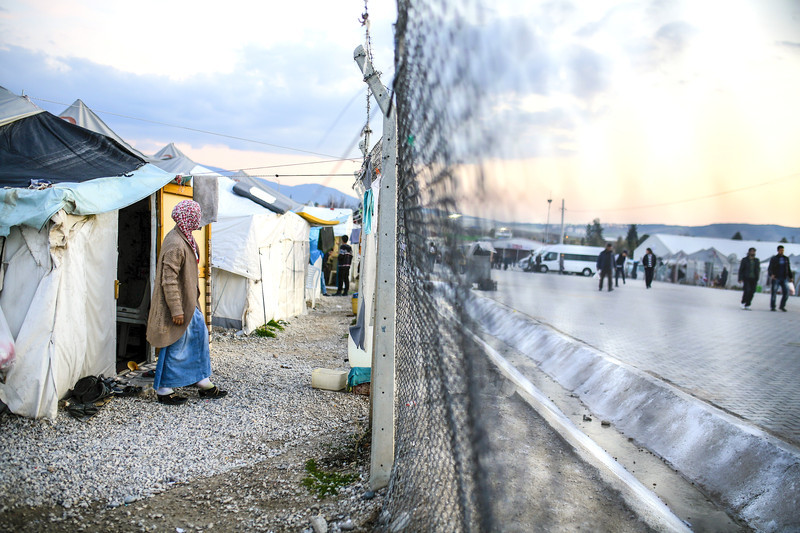
The European agreement aims to limit the arrival of refugees to EU countries and was issued in 2023 (EuroParl)
Between politics and economy, Why does Europe reject refugees?
The successive European decisions since 2023 come amid a dire need for European countries for the workforce as they lose one million workers annually, according to the EU Commissioner for Home Affairs, Ylva Johansson.
In remarks carried by the Associated Press on January 8 of this year, Johansson said that the EU countries face challenging political tasks to deal with aging.
This necessity reflects the difficulty of European countries in adhering to their successive decisions regarding the refugee and immigrant file, as well as their connection to the rise of the right in Europe, which has seen an increase in tone and form of the rhetoric against newcomers, at both the political and popular levels.
Johansson linked in her statements the increase in “hatred” to the arrival of immigrants “illegally”.
Two faces of the economic crisis
There are two sides to Europe’s economic crisis related to the refugee dossier. Both are pushing Europe to take different decisions regarding this file.
The first side, as Johansson mentioned, relates to the loss of the workforce, where the Associated Press quoted the European Union’s statistical agency (Eurostat) as saying that the proportion of the population aged 65 years will rise from 21.1% in 2022 to 31.3% by the end of this century.
In a report published by The Economist on June 15, 2023, it was mentioned that thriving labor markets need immigrants, whether they arrived legally or not.
It appears that European governments are trying to cover up economic problems resulting from rising energy prices, inflation, and more, by pinning the blame on the high number of refugees.
The Financial Times published a report on January 11, stating that wealthy countries have long used deception as they openly show hostility towards immigrants and secretly accept them to sustain the workforce presence.
It added that this system is beginning to change, as these governments face a three-point problem: they must respect human rights, maintain economic openness, and at the same time, meet their citizens’ wishes to stop migration, which means politicians will tighten the noose on migration through “political showmanship that hides the truth.”
Several European politicians, including German Chancellor Olaf Scholz, have expressed the need to reduce the allure of immigration to Europe or to make these countries “less attractive for asylum” by reducing all the benefits granted to refugees, thus making them less willing to go to Europe, by reducing financial aid, health services, and prolonging the issuance of applications acceptance decisions.
The far-right on top of concerns
The recent years have witnessed a notable rise of far-right political parties in several European countries, with some reaching power through coalition governments, as in Italy and the Netherlands, while the Alternative for Germany (AfD) party continues to steadily make gains.
These parties all echo a nearly identical and similar mantra: refugees are the primary reason for the economic collapse of European countries, coupled with warnings of cultural, religious, and ethnic differences, portending a demographic shift within the European Union.
According to a report published by the Carnegie Endowment for International Peace on January 18, the AfD party is the strongest in three German states, months before the upcoming general elections.
The party, despite being racist and anti-democratic, is engaged in a long-term conflict, pointing to other countries where similar parties hold advanced positions, such as the Netherlands and Hungary.
These parties utilize extremist, populist, and nationalist slogans, and one of these slogans pertains to opposing refugees.
According to the Carnegie Endowment, the constant presence of the far-right wing on the political scene in various European Union countries cannot be contained unless the root causes of its rise are effectively addressed. These causes are concerns about immigration, dissatisfaction with corruption, and economic crises.
A report published by The Financial Times on November 24, 2023, stated that what distinguishes Europe is its freedom, rule of law, tolerance, and human rights, which makes it a haven for asylum seekers. However, today’s Europe is “violating these values itself.”
Fadi Mousalli, an integration consultant in asylum laws, told Enab Baladi that the rise of the far-right wing plays an important role in increasing anti-refugee rhetoric through pressure, as the right relies primarily on “magnifying” the mistakes of some refugees.
He explained that most decisions issued are not implemented on the ground and resemble “media bombs” to show that the far-right is working to reduce the presence of migrants and control borders.
Syrians to Enab Baladi: We altered our course
What was published about the decision of the European Parliament or the national European decisions of the Union countries revealed that the content of the decisions targets those who think of migrating before doing so, which pushes those intending to migrate and seek asylum, including Syrian refugees in neighboring countries or individuals living inside Syria, to rethink the step.
Enab Baladi contacted Syrian refugees in neighboring countries to learn their views and the impact of the issued decisions on their decisions and desire to seek asylum in Europe.
Change in plans
Hani, a Syrian refugee residing in the capital, Beirut, since 2013, attempted to migrate to Europe “illegally” by sea several times but backed down at the last moment.
Hani (who withheld his full name for security reasons), originally from Qalaat al-Madiq in Hama city, told Enab Baladi that his fears increased based on the decisions he saw coming out of Europe and the testimonies of friends who reached Europe several months ago, along with the long procedures to obtain asylum or the rejection of applications.
The 24-year-old’s conviction that new decisions might abolish his rights as an asylum seeker was reinforced by the migrant and refugee law agreement, considering that what awaits him in the European Union countries is not worth risking his life for on a sea journey.
While the recent decisions made Hani hesitant, the resolve of Mohammed, who has been residing in Istanbul, Turkey, for 12 years, to leave for Europe has increased. According to what he told Enab Baladi, the situation in any European country will not be worse than what he suffers in Turkey, especially given the current political and economic conditions, in his opinion.
Loss of the right to choose
The head of the Arab European Organization for Human Rights in Germany, Mohammad Kazem Hindawi, told Enab Baladi that immigration and asylum policies vary from one country to another, based on the policy of each country and its particular laws. As for the new migration agreement, it specifically involves illegal immigrants.
Hindawi added that no mechanism for the implementation of the migration and asylum agreement has been arrived at yet, but from an implementation standpoint, it is legally “flawless,” especially with a study to be conducted on immigrant files.
Any law that will be issued will be presented to the judicial authority, which in turn will decide on its conformity with international laws and customs.
Mohammad Kazem Hindawi, Director of the Arab European Organization for Human Rights in Germany
Asylum seekers are no better off
The latest European decisions, whether the unified law or the national laws of European countries, not only affect those thinking of immigrating but also many Syrian asylum seekers in European Union countries are experiencing long waiting periods for their applications to be accepted. Syrian asylum seeker Moaz Kharboutli, who is still waiting for approval of his asylum request for a year and a half in the Netherlands, is one of these cases.
Kharboutli’s fears of having his file rejected increase with new decisions and the rise of the far-right, and the absence of interviews or information about the status of his file submitted about a year and a half ago, without any movement or result, according to his statement to Enab Baladi.
Kharboutli, originally from Eastern Ghouta in the Damascus countryside, aged 26, told Enab Baladi that the treatment of the staff when trying to inquire about the status of the file gets progressively worse.
Syrians inside Syria
The decision issued by the European Parliament and other national decisions also push not only Syrians in neighboring countries to review their decisions before heading to Europe but also those inside Syria who are living under harsher conditions and a tougher life.
In June 2023, the International Committee of the Red Cross (ICRC) revealed that about 90% of Syrians live below the poverty line, and more than 15 million Syrians need humanitarian aid.
While Syrians face internal conflict, economic inflation, stagnation, public health service collapse, home destruction, and the risk of vital infrastructure disruption, according to a statement from the committee, Syria is experiencing the largest displacement crisis in the world, with 6.8 million Syrians forcibly displaced, according to the latest statistics from the UN High Commissioner for Refugees (UNHCR) as of November 20, 2023.
The earthquake in February 2023 affected about 8.8 million people inside Syria and led to damage to infrastructure and homes.
According to the UNHCR, there are 5.2 million Syrian refugees in neighboring countries and Turkey.
Rabee (24), a young man from Daraa city, told Enab Baladi that his thoughts for the past three years had been focused on gathering funds to migrate, as he is nearing the completion of the required amount for immigration.
Rabee mentioned that his friends who had migrated and settled in Germany spoke of the positivity of working in that country and the high daily wage, which exceeds the monthly salary of an employee in Syria, according to him.
Rabee’s mother fell ill, prompting him to temporarily postpone his immigration decision until she recovers, deciding to immigrate in the summer of 2024.
He added that in the last four months, he followed a series of decisions made by the European Union in regards to immigration policy, in addition to his friends discussing the enforcement of many Syrians to return to the country they fingerprinted in, like Italy.
Recently, the spread of news related to the situation of refugees in reception centers, and not allowing them to integrate into society or work, raised fears in Rabee about undertaking immigration, leading to the cancellation of the idea.
Rabee’s determination to cancel the idea of migration increased after he lost his friend Arslan while trying to immigrate illegally through the Libyan coast without knowing whether his friend drowned or was imprisoned somewhere.
He decided to travel to the United Arab Emirates instead of Europe, arguing it remains better than risking sailing the sea and potentially losing significant amounts of money as immigration is no longer easy as before, according to him.
A worry eating him alive
Tayseer (29 years old) from the Qaboun district in Damascus, married and father of three daughters, works as a taxi driver, and lives in a house he bought years ago.
Tayseer told Enab Baladi that the idea of migrating to Europe has become a day and night obsession for him and his wife, dreaming of securing a decent life for their small family, gathering money for the children’s future, and living with dignity.
He added, “The idea of migration started to scare me more and recede in my mind about six months ago,” because the majority of the decisions taken by Europe aim to curb migration.
Continuing, “I will not migrate alone, I have a family and children; what if we face rejection? And what decisions will apply when we arrive? All these are unknown questions in my mind.”
The decisions coincided with his friends’ talk in Sweden about doubled taxes, and complaints that they consume their salaries, in addition to rising prices.
According to Tayseer, what he is now considering is staying and educating his daughters in Syria, and not jeopardizing them to an unknown fate.
Expected effects as the tragedy continues
Recent European moves concerning the migration file open the door to questions about the expected effects amidst the blockage of any prospects for a political solution or improvement in the living and economic reality in Syria. Also, the potential effects on those who have already left are queried.
According to the director of the Arab European Organization for Human Rights in Germany, Mohammad Kazem Hindawi, the first effects of the migration and asylum agreement’s implementation relate to the loss of the refugee’s right to choose the country they wish to seek asylum in. It is possible the country may refuse to receive them and resort to a third country to inquire about its ability to host them in exchange for 20,000 euros offered to the host country per refugee.
Those with first and second-degree relatives in the target country are exempt from losing the choice, Hindawi states.
He pointed out that the fear lies in poorer countries within the European Union exploiting refugees in exchange for the money paid, making the refugees unable to secure a decent living financially, which would force them to reconsider the issue of migration and asylum.
Social researcher Hussam al-Saad sees that these new European decisions may have negative repercussions. The issuance of decisions,” including the return of some refugees under the pretext of stability in the regions they came from,” could serve as an indirect pressure on refugees to make decisions to leave for countries where they can feel settled over the long term. As a result, many cases have already moved to other countries after obtaining citizenship or permanent residency, and many more are considering this option, according to al-Saad.
He continued that the choice of seeking asylum in Europe diminishes against the backdrop of restrictions and difficulties faced by Syrians, especially in Turkey, Lebanon, and Jordan, suggesting that the next stage may push people to return to Syria to escape these accumulated pressures.
if you think the article contain wrong information or you have additional details Send Correction
النسخة العربية من المقال
-
Follow us :
Most viewed
- Syrian Defense Ministry appoints "Abu Amsha" as Hama Brigade commander
- SDF faces two fronts... Damascus negotiates and Ankara wants war
- Al-Sharaa meets Bin Salman: Together towards a true partnership
- Former Syrian Interior Minister Mohammad al-Shaar surrenders to authorities
- Syrians hope for a new state without "wasta"












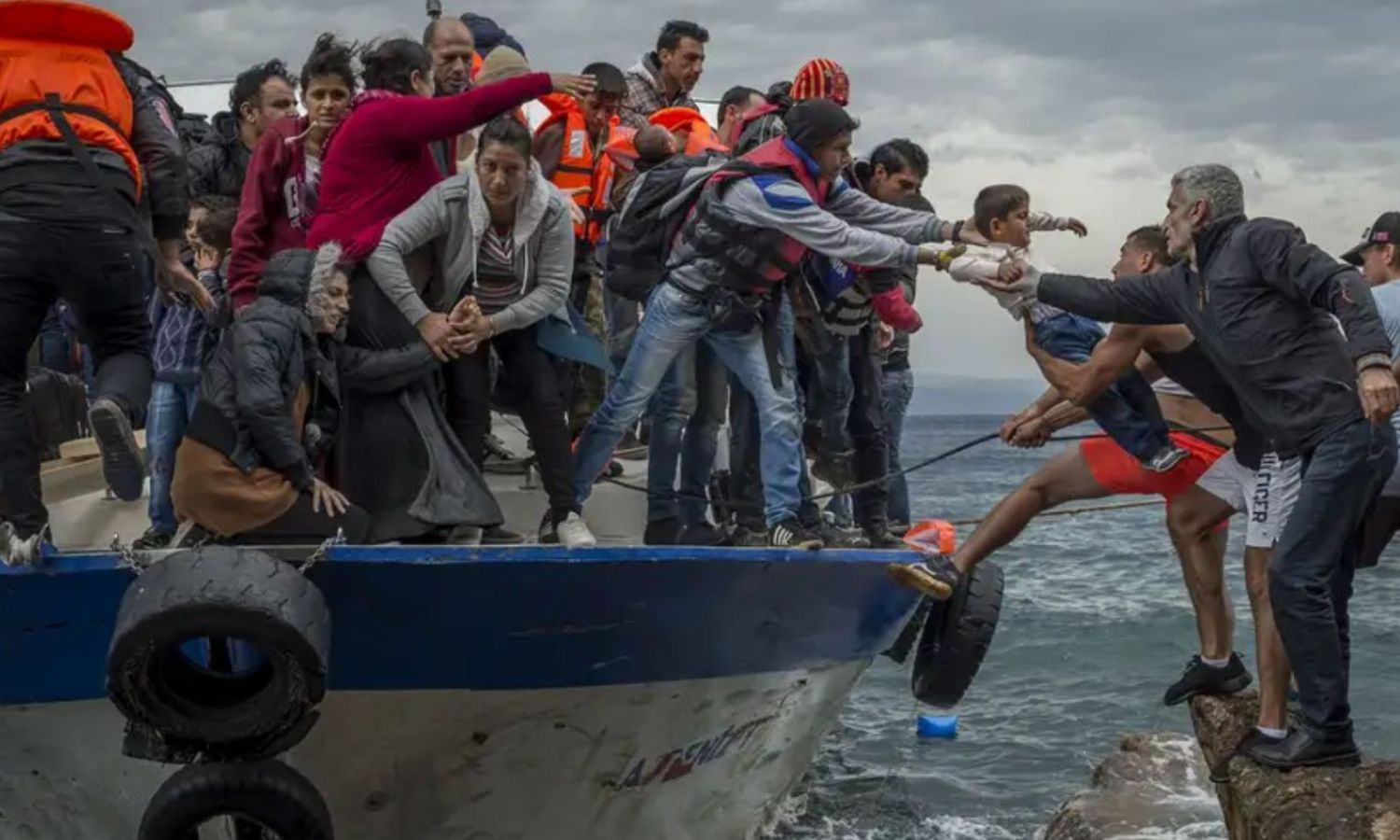
 Refugees arrive on the Greek island of Lesbos aboard a fishing boat (picture alliance)
Refugees arrive on the Greek island of Lesbos aboard a fishing boat (picture alliance)





 A
A
A
A
A
A
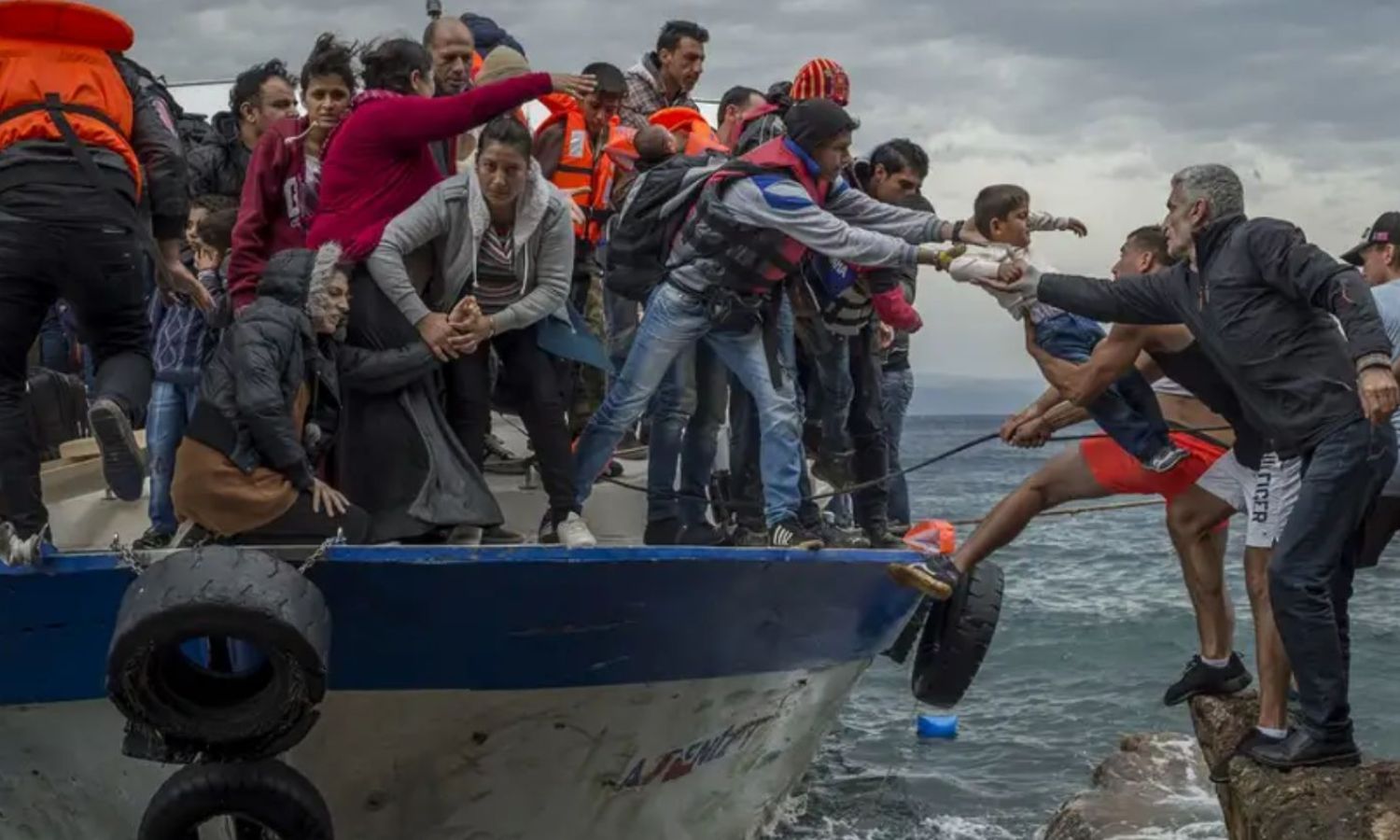

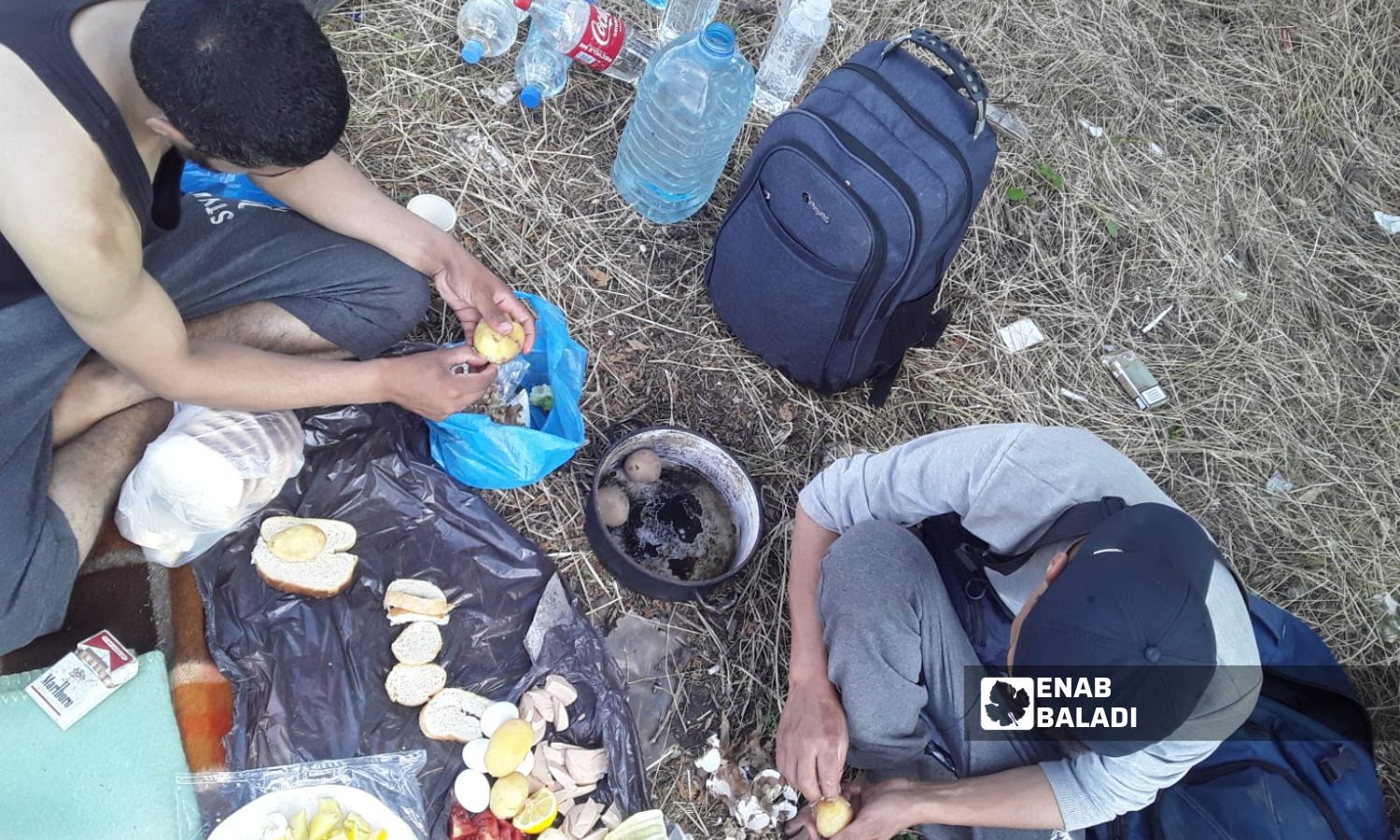
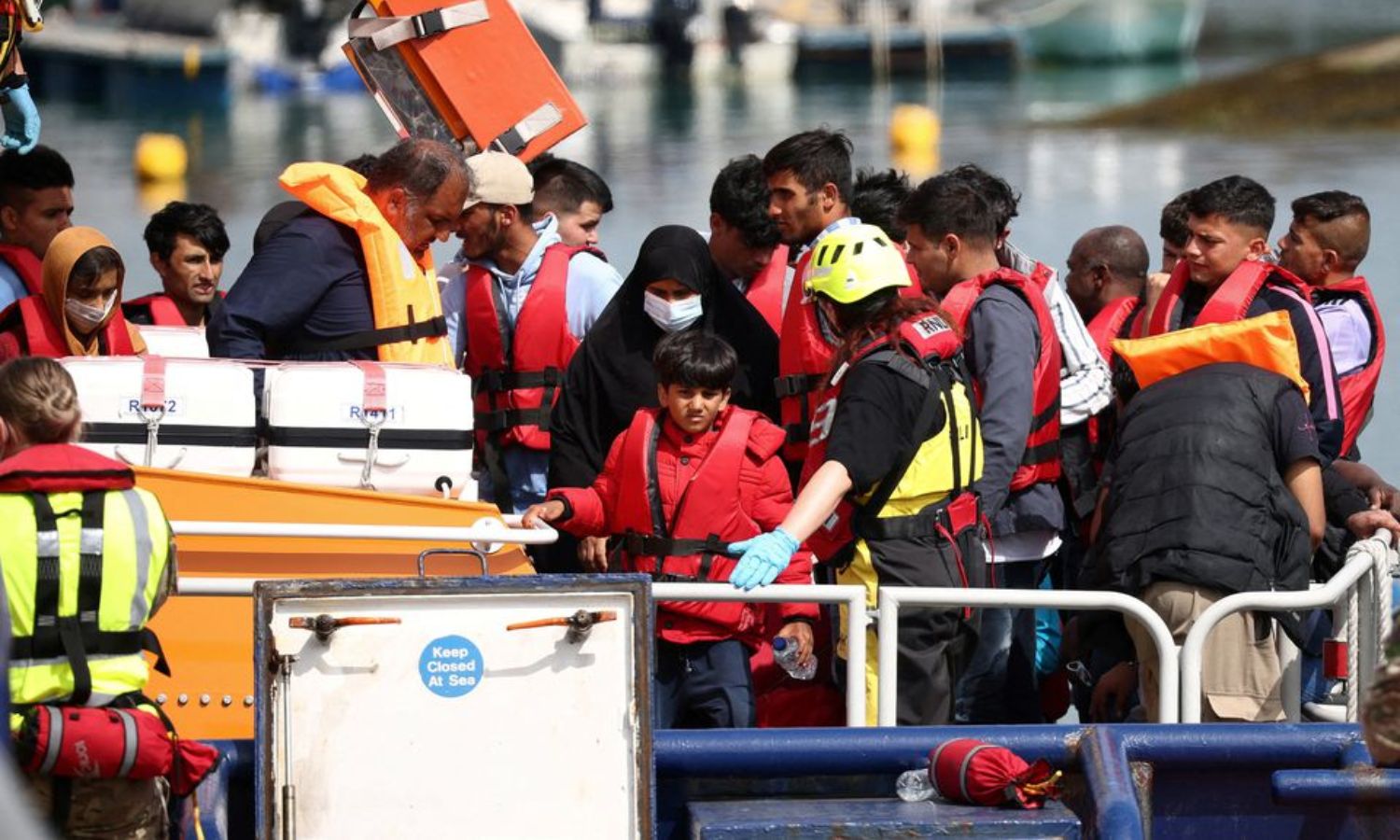







 More In-Depth
More In-Depth